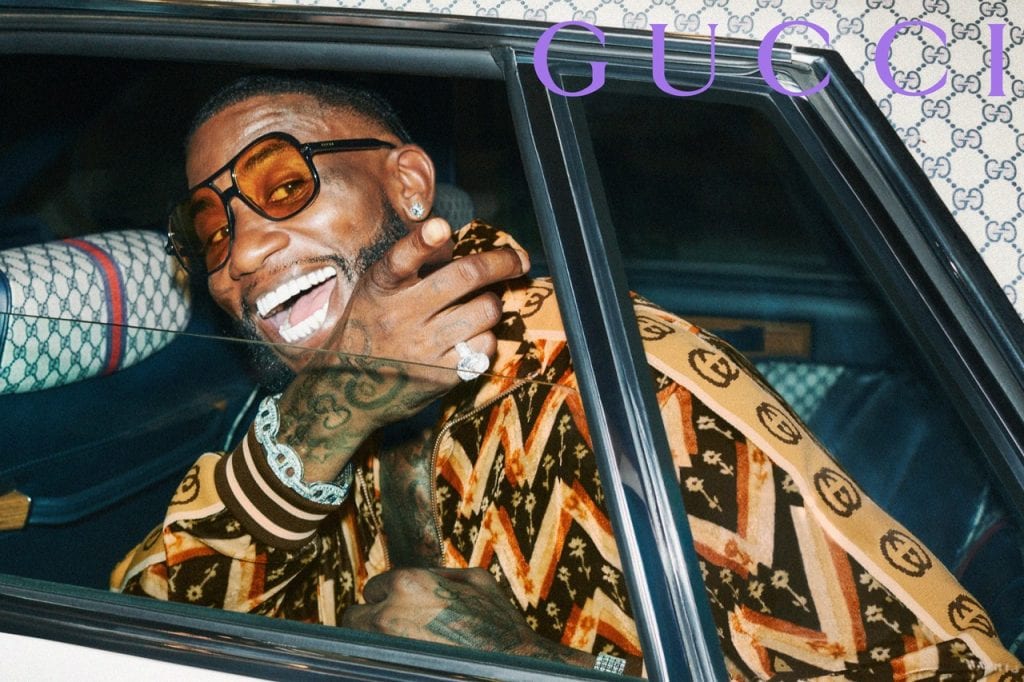A recent Google search for news relating to Italian design house, Gucci, resulted almost exclusively in articles about rapper Radric Davis – who is far better know by his stage name, Gucci Mane – and his recent release from prison and what Complex is calling his “upcoming clothing line.” As a result, it seems as though our longstanding inquiry as to why the fashion house has not taken legal action against the rapper in the past may be more relevant than ever.
As we have previously noted, it is interesting, given the oft-aggressive nature of luxury goods brands when it comes to their branding, that the iconic Italian brand has not taken a more confrontational approach to the famed rapper, who made his music debut in 2005. Gucci, the Kering-owned brand, which was founded in Florence in 1921, does not have a sizable presence in the music industry (or registered trademarks in this category), compared to say, Gucci Mane, but the Italian design house is not completely absent from this space. Consider its Chime For Change initiative, which consists of an annual “global concert event” and the corresponding merchandise, such as headphones.
AlYou may also remember that the design house launched the United Kingdom Music Fund in 2013 in an effort “to discover and nurture British music talent,” as well as the Gucci Timepieces & Jewellery Music Fund, which the brand launched that same year in China.
Then there is the brand’s penchant for dressing musicians. Gucci has entered into partnerships with Florence Welch and John Legend, among others, for the wardrobes for their world tours. And this past summer, Gucci’s creative director Alessandro Michele revealed that he had designed some of the costumes for Madonna’s world tour, and he has since created looks for a number of musicians, including Lady Gaga, Kesha, Harry Styles (with whom the brand and its creative director have a budding relationship), and Beyonce, among others.
Gucci’s failure to federally register its trademark in classes relating to music does not, of course, mean that it lacks grounds to potentially sue the similarly named rapper, as Gucci has amassed rights in the classes of goods in which it is using its name (given the first-to-use doctrine for trademarks in the U.S.). More than that, the difference in industries in which the two entities exist is also not necessarily problematic, given that trademark infringement claims can be initiated in connection with another’s unauthorized use of a mark on confusingly similar goods, including related ones. An argument could be made that music is, in fact, related to Gucci’s business, particularly in light of its various music-related ventures.
Still yet, there is a chance that Gucci would claim dilution, a cause of action that gives the owner of a “famous” (a legal term of art) trademark (such as Gucci, potentially) standing to forbid others from using their mark in a way that would lessen its uniqueness or its strength. In most cases, trademark dilution involves the unauthorized use of another’s trademark in connection with goods and/or services that do not compete with, or have little connection with, those of the trademark owner.
As for why we have not seen any public-facing Gucci vs. Gucci Mane trademark scuffles is likely the result of a number of reasons. There is a chance that Gucci cannot show that its brand has been damaged a result of the rapper. Or there is a possibility that Gucci is relatively lax when it comes to the endorsement of its intellectual property in the U.S. This is arguably true in comparison to some other big conglomerates, namely, its most immediate rival, LVMH, which spends a reported 2 percent of its total revenues to fight intellectual property violations associated with its marquee Louis Vuitton brand, for instance.
Still yet, and potentially most likely, there is a chance that Gucci sees the potential pitfalls of initiating such a legal battle. Gucci likely recognizes that such a suit, which would almost certainly make headlines, would have an inevitable element of public relations associated with it, and maybe, the group’s legal and PR teams have determined that the potential for bad press that could result from such a suit is not worth it when compared to the actual risks at play. Brands are increasingly considering the optics that come with their enforcement efforts, and tailoring their legal strategies in order to reconcile these oft-clashing realities.
UPDATED (October 1, 2019): Fast forward to 2019 and it appears that Gucci has formally embraced the like-named rapper, as Gucci Mane stars in the brand’s Cruise 2020 campaign, along with Iggy Pop, Sienna Miller, and Benedetta Barzini, among others.
*This article was initially published in July 2016, and has been updated accordingly.











